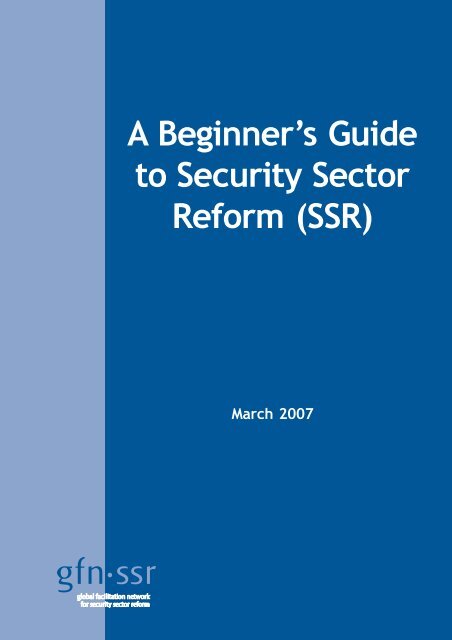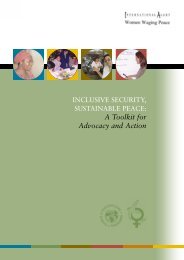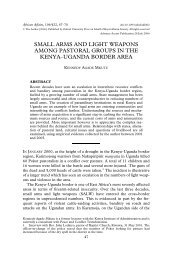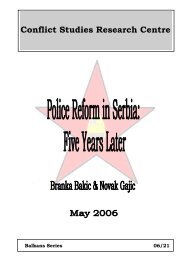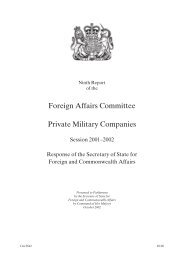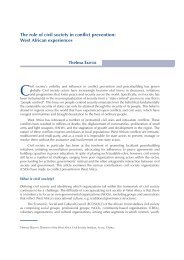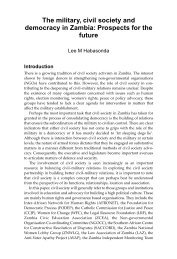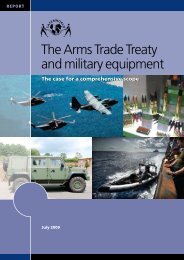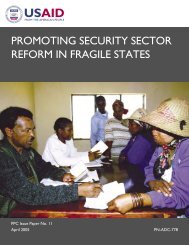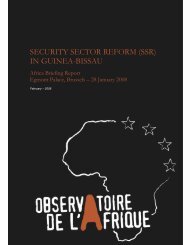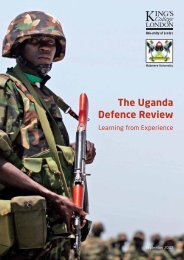GFN-SSR - A Beginner's Guide to Security Sector Reform (SSR)
GFN-SSR - A Beginner's Guide to Security Sector Reform (SSR)
GFN-SSR - A Beginner's Guide to Security Sector Reform (SSR)
Create successful ePaper yourself
Turn your PDF publications into a flip-book with our unique Google optimized e-Paper software.
A Beginner’s <strong>Guide</strong><br />
<strong>to</strong> <strong>Security</strong> Sec<strong>to</strong>r<br />
<strong>Reform</strong> (<strong>SSR</strong>)<br />
March 2007
A Beginner’s <strong>Guide</strong><br />
<strong>to</strong> <strong>Security</strong> Sec<strong>to</strong>r<br />
<strong>Reform</strong> (<strong>SSR</strong>)<br />
March 2007
A Beginner’s <strong>Guide</strong><br />
<strong>to</strong> <strong>Security</strong> Sec<strong>to</strong>r<br />
<strong>Reform</strong> (<strong>SSR</strong>)<br />
This guide serves as an introduction <strong>to</strong> <strong>SSR</strong> and suggests some key sources for<br />
further reading. It is available as a downloadable document from<br />
www.ssrnetwork.net along with a database of key UK and international<br />
ac<strong>to</strong>rs in <strong>SSR</strong> and a comprehensive <strong>SSR</strong> acronyms list, which form useful<br />
complementary reading <strong>to</strong> this guide.<br />
Contents<br />
• What is <strong>SSR</strong>?<br />
• Some commonly used definitions of <strong>SSR</strong><br />
• How has <strong>SSR</strong> developed? How is it a part of the International Development<br />
Agenda?<br />
• Core principles and challenges of implementing <strong>SSR</strong><br />
• The Global Conflict Prevention Pool’s <strong>Security</strong> Sec<strong>to</strong>r <strong>Reform</strong> Strategy<br />
• What are the areas of <strong>SSR</strong> engagement?<br />
• Where can I find further sources of information on <strong>SSR</strong>?<br />
What is <strong>SSR</strong>?<br />
The objective of <strong>SSR</strong> is <strong>to</strong> create a secure environment that is conducive <strong>to</strong><br />
development, poverty reduction, good governance and, in particular, the growth of<br />
democratic states and institutions based on the rule of law. This relies on the<br />
ability of the state <strong>to</strong> mitigate its people’s vulnerabilities through development,<br />
and <strong>to</strong> use a range of policy instruments <strong>to</strong> prevent or address security threats<br />
that affect society’s well-being. This includes establishing appropriate civilian<br />
oversight of security ac<strong>to</strong>rs. Hence, a broader range of state institutions is now<br />
being considered in the provision of security, with the military seen as one<br />
instrument among many. The ‘security sec<strong>to</strong>r’ includes traditional security ac<strong>to</strong>rs<br />
such as the armed forces and police; oversight bodies such as the executive and<br />
legislature; civil society organisations; justice and law enforcement institutions<br />
such as the judiciary and prisons; as well as non-state security providers.
Some commonly used definitions of <strong>SSR</strong><br />
The Global Conflict Prevention Pool (GCPP) defines <strong>SSR</strong> as:<br />
“<strong>SSR</strong> is a broad concept that covers a wide spectrum of disciplines,<br />
ac<strong>to</strong>rs and activities. In its simplest form, <strong>SSR</strong> addresses securityrelated<br />
policy, legislation, structural and oversight issues, all set within<br />
recognised democratic norms and principles.” (Department for<br />
International Development, Ministry of Defence and Foreign<br />
Commonwealth Office, 2004)<br />
The Organisation for Economic Co-operation and Development Development<br />
Assistance Committee (OECD-DAC) defines <strong>SSR</strong> as:<br />
“<strong>Security</strong> system reform (<strong>SSR</strong>) seeks <strong>to</strong> increase partner countries’<br />
ability <strong>to</strong> meet the range of security needs within their societies in a<br />
manner consistent with democratic norms and sound principles of<br />
governance, transparency and the rule of law. <strong>SSR</strong> includes, but<br />
extends well beyond, the narrower focus of more traditional security<br />
assistance on defence, intelligence and policing.” (OECD, 2004)<br />
How has <strong>SSR</strong> developed? How is it a part of the International<br />
Development Agenda?<br />
The <strong>SSR</strong> policy agenda has developed over the past 15 years as the traditional<br />
concept of security has been modified. During the Cold War, <strong>SSR</strong> concerns were<br />
seen as secondary <strong>to</strong> which sides ruling groups <strong>to</strong>ok in the East-West conflict.<br />
Development practitioners largely avoided security issues, which were inevitably<br />
bound up with political ideologies, and security policy focussed on the protection<br />
of states from military threats and, very often, providing illegitimate regimes with<br />
illegitimate support.<br />
Since the end of the Cold War concerns have changed and security challenges<br />
have become more complex. It is now recognised that states have often failed <strong>to</strong><br />
fulfil their security obligations, or have even actively compromised the security of<br />
their own people. Consequently, the security agenda has broadened <strong>to</strong> include<br />
the well-being of populations and human rights, <strong>SSR</strong> being part of the wider ‘human<br />
security’ framework. In this context, security and development have become<br />
increasingly linked – international security ac<strong>to</strong>rs have realised that their shortterm<br />
operations will not bring sustainable benefit without coordinating their activites<br />
with longer-term development work. Similarly, development practitioners have
ealised that it is impractical <strong>to</strong> consider development without taking security<br />
issues in<strong>to</strong> account.<br />
Violence and security are a priority concern of the poor and other vulnerable groups,<br />
especially women and children, who are often subject <strong>to</strong> bad policing, weak justice<br />
and corrupt militaries. <strong>Security</strong> is also intrinsic <strong>to</strong> personal and state safety, access<br />
<strong>to</strong> government services and participation in political processes. <strong>SSR</strong> contributes<br />
<strong>to</strong> the development of appropriate structures <strong>to</strong> help prevent instability and violent<br />
conflict. It can contribute <strong>to</strong> creating the conditions necessary for economic and<br />
social development and the protection of human rights and is therefore a prerequisite<br />
<strong>to</strong> achieving the Millennium Development Goals.<br />
The UK Government has a collaborative approach that attempts <strong>to</strong> combine the<br />
knowledge, expertise and experience of the Department for International<br />
Development, the Foreign and Commonwealth Office, and the Ministry of<br />
Defence.<br />
Other bilateral and multilateral institutions also recognise the potential of <strong>SSR</strong>. In<br />
June 2006 the EU adopted an <strong>SSR</strong> policy and began work on the practicalities of<br />
its implementation later that year. Similarly, the UN views <strong>SSR</strong> as an integral part<br />
of its preventative approach <strong>to</strong> conflict.<br />
Core principles and associated challenges of implementing<br />
<strong>SSR</strong><br />
The OECD DAC has agreed on a number of working principles for <strong>SSR</strong>:<br />
• People-centred, locally-owned and based on democratic norms and human<br />
rights principles and the rule of law, seeking <strong>to</strong> provide freedom from fear.<br />
• Seen as a framework <strong>to</strong> structure thinking about how <strong>to</strong> address diverse<br />
security challenges facing states and their populations through more integrated<br />
development and security policies and through greater civilian involvement<br />
and oversight.<br />
• Founded on activities with multi-sec<strong>to</strong>ral strategies, based on a broad<br />
assessment of the range of security needs of the people and the state.<br />
• Developed adhering <strong>to</strong> basic principles underlying public sec<strong>to</strong>r reform such<br />
as transparency and accountability.<br />
• Implemented through clear processes and policies that aim <strong>to</strong> enhance the<br />
institutional and human capacity needed for security policy <strong>to</strong> function<br />
effectively.
The literature reveals that there are also a number of associated challenges involved<br />
in the implementation of <strong>SSR</strong>:<br />
• It can be difficult <strong>to</strong> find local ownership for <strong>SSR</strong>, especially where it is most<br />
needed, for example where security forces are part of the problem or where<br />
<strong>SSR</strong> may have the potential <strong>to</strong> change current power relationships.<br />
• <strong>SSR</strong> is expensive and human resource intensive – it requires the cooperation<br />
of a wide range of ac<strong>to</strong>rs and expertise from a range of different governmental<br />
departments and non-governmental institutions.<br />
• <strong>SSR</strong> includes a wide range of activities and can be deployed in support of a<br />
number of key objectives. This can often lead <strong>to</strong> inconsistencies and unevenness<br />
in implementation. The challenge is <strong>to</strong> provide a consistent and coherent overall<br />
framework with some form of prioritisation <strong>to</strong> avoid a mixed bag of ad hoc<br />
activities.<br />
• <strong>SSR</strong> takes a long-time <strong>to</strong> bring about changes, which may deter donors from<br />
engaging in this type of work.<br />
The Global Conflict Prevention Pool’s <strong>Security</strong> Sec<strong>to</strong>r <strong>Reform</strong><br />
Strategy<br />
The GCPP’s <strong>SSR</strong> Strategy provides the GCPP and the Africa Conflict Prevention<br />
Pool (ACPP) with a central base for resources, policy advice and information on<br />
<strong>SSR</strong>.<br />
The Strategy recognises the need <strong>to</strong> influence thinking and develop understanding<br />
of <strong>SSR</strong> among conflict prevention pool partners – across Whitehall and<br />
internationally. To achieve this it focuses on four key outputs:<br />
• analysis and research for policy development;<br />
• effective institutional reform;<br />
• capacity building; and<br />
• mainstreaming and international influencing.<br />
The Strategy has provided the funding for two key resources – the <strong>Security</strong> Sec<strong>to</strong>r<br />
Development Advisory Team (SSDAT) and <strong>GFN</strong>-<strong>SSR</strong>. These bodies enable<br />
GCPP geographical strategies <strong>to</strong> access the support they require <strong>to</strong> plan effective<br />
<strong>SSR</strong> programmes on the ground, notably in Jamaica, Uganda and Sierra Leone<br />
where the UK has taken the lead in promoting <strong>SSR</strong>. Funding from the Strategy<br />
has also (in part through <strong>GFN</strong>-<strong>SSR</strong>) provided practical support <strong>to</strong> the establishment<br />
of regional networks of civil society groups, academics, parliamentarians and<br />
government officials, building their capacity <strong>to</strong> understand and advocate <strong>SSR</strong> needs.
The Strategy also funds places on Defence Education programmes which are<br />
aimed at developing professional and democratic Armed Forces; underpinned by<br />
transparent governance regimes. As well as complementing other <strong>SSR</strong> initiatives<br />
and building regional confidence, these programmes facilitate wider engagement<br />
where entry points have been limited.<br />
Funding for the Strategy amounted <strong>to</strong> £6.25 million in financial year 06/07 and the<br />
same amount has been allocated for 07/08.<br />
What are the areas of <strong>SSR</strong> engagement?<br />
<strong>SSR</strong> engagement necessitates a multisec<strong>to</strong>ral approach including defence,<br />
intelligence, policing, prisons, civil society, civilian oversight, financial management,<br />
and disarmament, demobilisation and reintegration (DDR). Further details on each<br />
of these sec<strong>to</strong>rs are provided in the corresponding sections below.<br />
Where can I find further sources of information on aspects<br />
of <strong>SSR</strong>?<br />
The following texts provide a useful introduction <strong>to</strong> the <strong>SSR</strong> policy agenda:<br />
<strong>SSR</strong>: General<br />
• Organisation for Economic Co-operation and Development, 2005,<br />
‘Introduction <strong>to</strong> <strong>Security</strong> Sec<strong>to</strong>r <strong>Reform</strong>’, Development Assistance<br />
Committee, OECD, Paris<br />
<strong>Security</strong> sec<strong>to</strong>r reform (<strong>SSR</strong>) is fundamentally important <strong>to</strong> effective conflict<br />
prevention and peacebuilding. It helps ensure and sustain the stability<br />
necessary for development. This Organisation for Economic Co-operation and<br />
Development (OECD) paper summarises key <strong>SSR</strong> programme design and<br />
implementation issues. Emphasising effective and democratically accountable<br />
institutions, <strong>SSR</strong> provides a framework <strong>to</strong> develop strategies <strong>to</strong> meet a nationallydefined<br />
vision of security and development needs.<br />
• Organisation for Economic Co-operation and Development, 2004,<br />
‘<strong>Security</strong> System <strong>Reform</strong> and Governance: Policy and Good Practice’,<br />
Development Assistance Committee (DAC) <strong>Guide</strong>lines and Reference<br />
Document, Organisation for Economic Co-operation and Development<br />
(OECD), Paris<br />
How do you foster through governance reforms a secure environment that is<br />
conducive <strong>to</strong> poverty reduction and sustainable development? What are the<br />
key components of security? These are questions that are addressed in this
publication by the Development Assistance Committee (DAC) of the<br />
Organisation for Economic Co-operation and Development (OECD). The<br />
research suggests that the traditional concept of security is being redefined.<br />
The document sets out the key concepts of security system reform (<strong>SSR</strong>)<br />
and suggests ways <strong>to</strong> support it in developing countries.<br />
Defence<br />
Armed forces need <strong>to</strong> respond <strong>to</strong> the strategic context by building militarily effective<br />
institutions, whilst also ensuring that they remain responsive <strong>to</strong> the legitimate<br />
demands of a democratic society. A major challenge for civilian and military leaders<br />
is <strong>to</strong> strike a balance between these (sometimes competing) requirements. It is<br />
also important <strong>to</strong> take account of the his<strong>to</strong>ry and traditions of individual armed<br />
forces, which are normally critical fac<strong>to</strong>rs in maintaining their identity, sense of<br />
shared purpose and morale. However, these should not stand in the way of achieving<br />
efficiency, effectiveness, affordability, duty, political neutrality, human rights, justice<br />
and the development of civilian control through democratic institutions.<br />
• Chuter, D., 2000, ‘Defence Transformation: A short guide <strong>to</strong> the issues’,<br />
ISS Monograph no. 49, Pre<strong>to</strong>ria<br />
How have nations adapted their defence policies <strong>to</strong> the post-Cold War world?<br />
What is required <strong>to</strong> manage armed forces effectively in a democracy? This<br />
Institute for <strong>Security</strong> Studies (ISS) paper provides a practical guide <strong>to</strong> defence<br />
transformation, beginning with fundamental questions about the role and place<br />
of the military in civil society. It argues that defence transformation is not a<br />
single process with a generic blueprint; rather it must be an organic process<br />
that grows out of each country’s particular circumstances.<br />
Intelligence<br />
Intelligence services play a vital role in protecting national security, but it is<br />
important that they should be subject <strong>to</strong> appropriate democratic civilian oversight.<br />
Such oversight is necessary <strong>to</strong> provide appropriate checks on their power, and<br />
also <strong>to</strong> ensure that the need for these services <strong>to</strong> operate clandestinely does not<br />
conflict with the principle of transparent democratic governance. They should derive<br />
their existence and powers from legislation, and the use of special powers should<br />
be grounded in law. The executive exercises direct control, determines the budget<br />
and sets general guidelines and priorities for the intelligence services. The judiciary<br />
should oversee the use of their special powers, and judges should prosecute any<br />
wrongdoing.
• Hannah, G., O’Brien, K. and Rathmell, A., 2005, ‘Intelligence and <strong>Security</strong><br />
Legislation for <strong>Security</strong> Sec<strong>to</strong>r <strong>Reform</strong>’, RAND Europe, Cambridge<br />
What choices are required when designing and implementing legislative<br />
oversight of intelligence and security services? This RAND report provides an<br />
opportunity <strong>to</strong> learn from the successes and failures of intelligence and security<br />
legislation in various countries. Case studies from the UK, Canada, South<br />
Africa, Germany, the Czech Republic and Argentina provide a balance between<br />
developed and developing countries alongside evolutionary versus revolutionary<br />
intelligence reforms.<br />
Policing<br />
The main objectives of <strong>SSR</strong> from a policing perspective are <strong>to</strong> increase respect for<br />
human rights and <strong>to</strong> provide greater security for citizens, rather than focus<br />
exclusively on the security of the state. In countries making the transition from<br />
authoritarian government or violent conflict, a particular priority in the short-term<br />
can be <strong>to</strong> ‘demilitarise’ the police. This often means ensuring a clear functional<br />
differentiation between a heavily armed, unified military, physically separated from<br />
the population; and a community based police service which focuses on local<br />
needs policing rather than act entirely as an agent of the state. This is a precondition<br />
for establishing democracy and providing a favourable environment for economic<br />
development. For further information on the role of the police in facilitating improved<br />
security and access <strong>to</strong> justice, please visit the GSDRC website.<br />
• Ziegler, M. and Nield, R. 2001, ‘From Peace <strong>to</strong> Governance: Police<br />
<strong>Reform</strong> and the International Community’, Washing<strong>to</strong>n Office on Latin<br />
America (WOLA)<br />
This report summarises the findings of a conference, ‘Police <strong>Reform</strong> and the<br />
International Community: From Peace Processes <strong>to</strong> Democratic Governance’.<br />
Despite the political risks, the positive aspects of police reform have encouraged<br />
donors <strong>to</strong> participate. Police reform can support demilitarisation and<br />
democratisation, boost economic growth, reduce poverty, and improve respect<br />
for human rights. However, case studies from Central and South America and<br />
South Africa highlight the difficulty of achieving reform where violent crime is<br />
on the rise.<br />
Civilian Oversight<br />
Civilian oversight and accountability is needed <strong>to</strong> ensure that state-military relations<br />
are conducive <strong>to</strong> democratic politics and that human security is promoted as well<br />
as national security. This can be difficult <strong>to</strong> achieve where there are complex<br />
technical issues, vested interests and a culture of secrecy at stake. Approaches
in this area often include building the capacity and expertise of a variety of state<br />
institutions, including governments, legislatures, judicial institutions, ombudsmen<br />
and complaints bodies. Non-state ac<strong>to</strong>rs can also play an important role.<br />
• Born, H., Fluri, P., and Lunn, S., (eds.) 2003, ‘Oversight and Guidance:<br />
The Relevance of Parliamentary Oversight for the <strong>Security</strong> Sec<strong>to</strong>r and<br />
its <strong>Reform</strong>: A Collection of Articles on Foundational Aspects of<br />
Parliamentary Oversight of the <strong>Security</strong> Sec<strong>to</strong>r’, DCAF/NATO<br />
Parliamentary Assembly, Geneva<br />
<strong>Security</strong> policy is widely believed <strong>to</strong> be the task of the executive. Parliaments<br />
are regarded as less suitable for making security decisions. This paper from<br />
the Geneva Centre for the Democratic Control of Armed Forces (DCAF) argues<br />
that parliamentary oversight of the security sec<strong>to</strong>r and its reform is in the<br />
interest of democracy and security. <strong>Security</strong> sec<strong>to</strong>r reform creates systematic<br />
accountability and transparency on the premise of increased democratic control,<br />
placing it within the context of the good governance agenda.<br />
Civil Society<br />
The term ‘civil society’ is often used with imprecision, but is generally<br />
unders<strong>to</strong>od <strong>to</strong> encompass areas of activity that take place outside of<br />
the state’s direct control. It includes a wide range of ac<strong>to</strong>rs, including<br />
non-governmental organisations, grassroots, professional, religious and<br />
labour organisations and groups, as well as the media. The security<br />
sec<strong>to</strong>r has his<strong>to</strong>rically proven one of the most resistant <strong>to</strong> public input,<br />
and a major objective of <strong>SSR</strong> is <strong>to</strong> make the sec<strong>to</strong>r more accountable<br />
<strong>to</strong> citizens and communities, and more responsive <strong>to</strong> their needs. Civil<br />
society can play an important role in encouraging the state <strong>to</strong> fulfil its<br />
responsibilities transparently and accountably. This can be through a<br />
range of functions including advocacy, moni<strong>to</strong>ring, policy support and<br />
service delivery.<br />
• Ball, N. and Brzoska, M., 2002, ‘Voice and Accountability in the <strong>Security</strong><br />
Sec<strong>to</strong>r’, Bonn International Centre for Conversion, Bonn<br />
Why is security important in human development? How can the security sec<strong>to</strong>r<br />
be held accountable? This paper from the Bonn International Center for<br />
Conversion (BICC) discusses the need <strong>to</strong> keep the security sec<strong>to</strong>r accountable<br />
and under democratic, civil control. It argues for civil oversight, transparency,<br />
respect between civil authorities and security forces, and commitment from<br />
country leadership.
Disarmament, Demobilisation and Reintegration (DDR)<br />
The disarmament, demobilisation and reintegration of ex-combatants in<strong>to</strong><br />
peacetime economic and social life is essential for res<strong>to</strong>ring security. It can be an<br />
important part of <strong>SSR</strong> during transitions <strong>to</strong> peace, although it sometimes takes<br />
place before any <strong>SSR</strong> intervention begins. DDR programmes are complex and<br />
include political negotiations, humanitarian relief, the technical aspects of weapon<br />
disposal and socio-economic interventions <strong>to</strong> provide livelihoods, training and skills.<br />
• Douglas, I. et al, 2004, ‘Disarmament, Demobilisation and Reintegration:<br />
A Practical Field and Classroom <strong>Guide</strong>’, GTZ, NODEFIC, PPC and SNDC<br />
Successful programmes for the disarmament, demobilisation and reintegration<br />
(DDR) of former combatants are essential for sustainable peace and<br />
development. There are a variety of specific instruments and approaches that<br />
can support DDR programmes when adapted <strong>to</strong> the implementation conditions<br />
of particular countries. This training book aims <strong>to</strong> support effective planning by<br />
providing a comprehensive overview of all aspects of DDR operations. It is a<br />
product of the partnership between the Swedish National Defence College<br />
(SNDC), the Norwegian Defence International Centre (FOKIV), the Pearson<br />
Peacekeeping Centre (PPC), and the German Technical Cooperation (GTZ).<br />
Financial Management<br />
<strong>Reform</strong> of inefficient and unaccountable security sec<strong>to</strong>r expenditure is important<br />
for democratic control and for effective use of public finances. The security sec<strong>to</strong>r<br />
can often be an active breeding ground for financial corruption in developing<br />
countries. <strong>Reform</strong> includes encouraging governments <strong>to</strong> make sure that security<br />
expenditure forms part of the standard public resource allocation and management<br />
process; that it is transparent and affordable; and that resources are allocated<br />
according <strong>to</strong> priorities within the security sec<strong>to</strong>r and between sec<strong>to</strong>rs. ‘Rightsizing’<br />
the security sec<strong>to</strong>r aims <strong>to</strong> ensure that expenditure is appropriate, and<br />
does not divert resources needlessly from other areas such as development.<br />
Tackling corruption in all sec<strong>to</strong>rs of government activity is important, including the<br />
security sec<strong>to</strong>r.<br />
• Hendrickson, D. and Ball, N. 2002, ‘Off-budget Military Expenditure and<br />
Revenue: Issues and Policy Perspectives for Donors’, Conflict <strong>Security</strong><br />
and Development Group Occasional Papers<br />
Off-budget military expenditure is more widespread than is generally recognised.<br />
It is a significant problem for both developing countries and the donor<br />
community as it undermines macro-economic stability and efforts <strong>to</strong> promote<br />
poverty reduction, and is also an indica<strong>to</strong>r that there are accountability problems<br />
with the military.
<strong>GFN</strong>-<strong>SSR</strong> aims <strong>to</strong> promote better networking and information sharing within<br />
the developing field of security sec<strong>to</strong>r reform. It is a resource funded by the UK<br />
Government’s Global Conflict Prevention Pool, run jointly by the Foreign &<br />
Commonwealth Office (FCO), Ministry of Defence (MoD) and Department for<br />
International Development (DfID).<br />
<strong>GFN</strong>-<strong>SSR</strong><br />
International Development Department, School of Public Policy<br />
University of Birmingham B15 2TT United Kingdom<br />
Tel: +44 (0)121 414 3492 Fax: +44 (0)121 414 7995<br />
Email: enquiries@ssrnetwork.net<br />
Web: www.ssrnetwork.net


